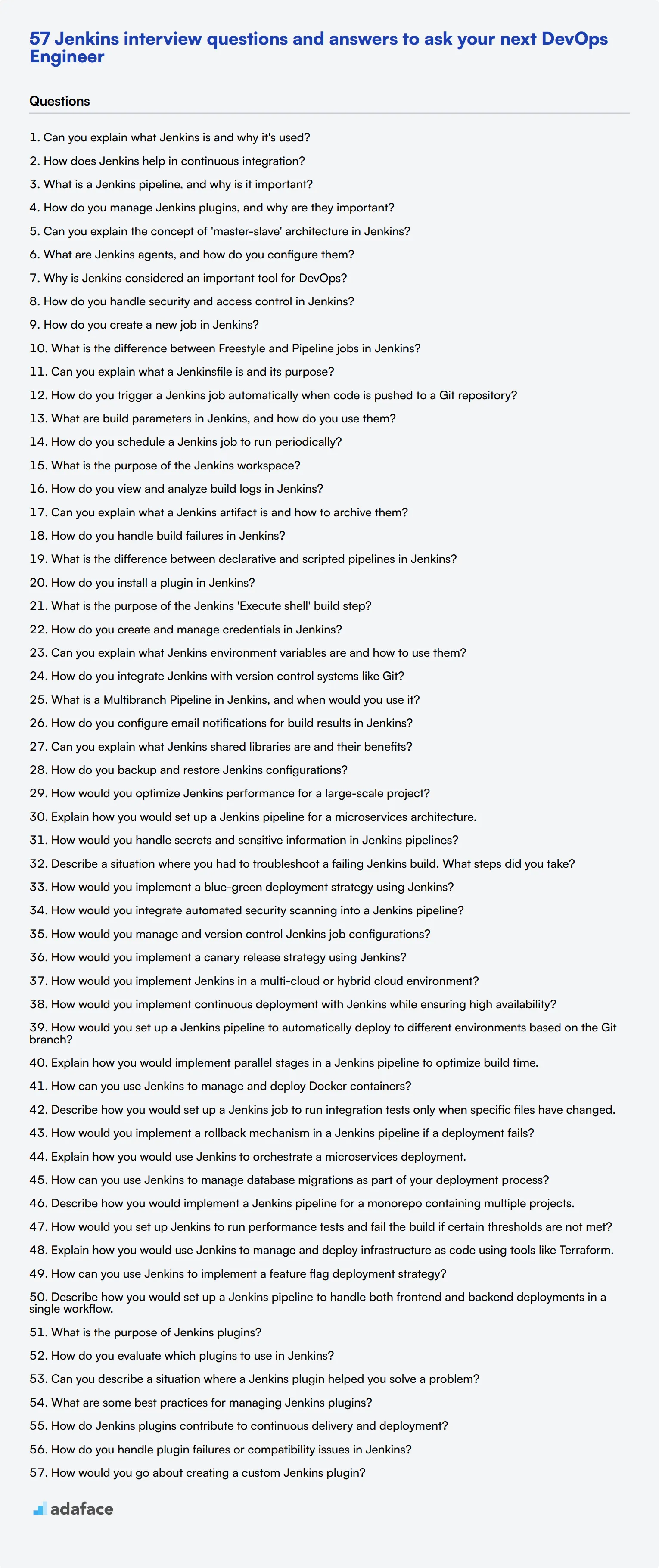Interviewing candidates for Jenkins roles can be challenging without the right set of questions. Using well-structured questions ensures you assess their expertise effectively and make a sound hiring decision. Explore skills required for DevOps engineers to get a broader understanding of the role.
This blog post compiles an extensive list of Jenkins interview questions segmented by experience and focus areas. You will find sections targeting general, junior, intermediate, pipeline-related, and plugin-related questions.
Using this guide, you can streamline your interview process and identify candidates with the right skills. Consider complementing the interview with an Ansible and Jenkins online test to gauge their practical abilities.
Table of contents
8 general Jenkins interview questions and answers
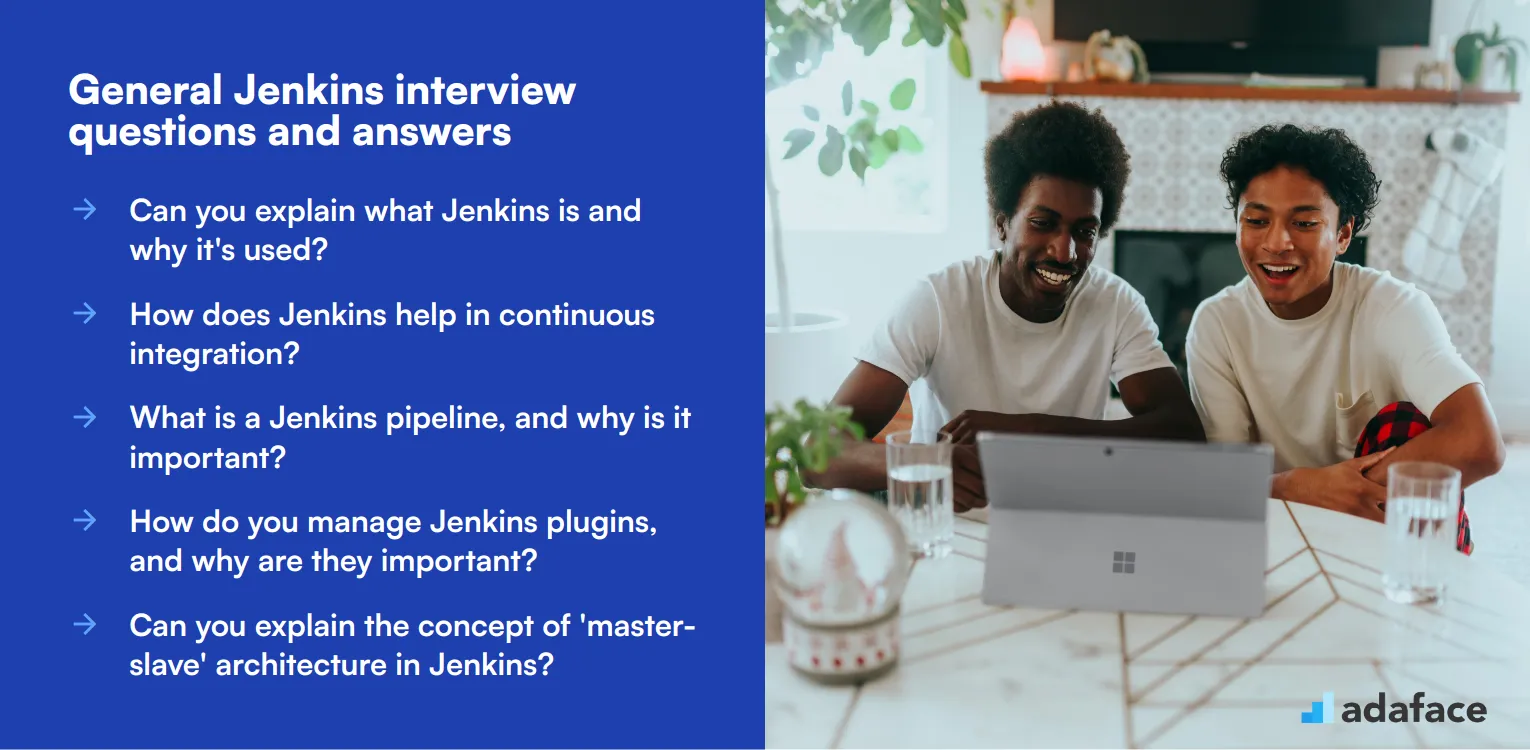
When you're interviewing candidates for Jenkins-related roles, it's essential to ask the right questions to gauge their understanding and experience. Use these eight general Jenkins interview questions to ensure your applicants have the foundational knowledge and skills needed for the job.
1. Can you explain what Jenkins is and why it's used?
Jenkins is an open-source automation server that helps automate parts of software development related to building, testing, and deploying, facilitating continuous integration and continuous delivery (CI/CD). It's widely used to improve the efficiency of software development processes.
An ideal candidate should highlight Jenkins' role in automating repetitive tasks, improving code quality, and enabling faster delivery of software. Look for responses that show a clear understanding of Jenkins' impact on the development lifecycle.
2. How does Jenkins help in continuous integration?
Jenkins supports continuous integration by automating the testing and integration of new code changes into the main codebase. It automatically triggers builds and tests whenever new code is committed, ensuring that code changes are validated continuously.
Candidates should mention Jenkins' ability to integrate with various version control systems like Git and its use of plugins to extend its functionality. Look for explanations that showcase their understanding of how Jenkins ensures code stability and quality through continuous integration.
3. What is a Jenkins pipeline, and why is it important?
A Jenkins pipeline is a suite of plugins that support implementing and integrating continuous delivery pipelines into Jenkins. It allows you to define an entire software build process, including build, test, and deploy, in a script.
Candidates should emphasize the importance of pipelines in automating complex workflows and ensuring repeatable and reliable builds. Look for answers that demonstrate their experience with pipeline as code and the benefits it brings to the CI/CD process.
4. How do you manage Jenkins plugins, and why are they important?
Jenkins plugins extend the core functionality of Jenkins, allowing it to integrate with various tools and platforms. Managing plugins involves installing, updating, and occasionally removing them to ensure compatibility and security.
Strong candidates should discuss their experience with popular plugins like Git, Maven, or Docker, and explain how they keep plugins updated to leverage new features and security fixes. Look for their understanding of the importance of plugins in customizing Jenkins to meet project-specific needs.
5. Can you explain the concept of 'master-slave' architecture in Jenkins?
In Jenkins, the master-slave architecture allows for distributed builds. The master node manages the build process, while slave nodes execute the build tasks. This setup helps in balancing the load and speeding up the build process.
Candidates should mention how this architecture helps in efficiently managing large-scale builds and distributing workloads across multiple nodes. Look for their understanding of setting up and configuring master-slave nodes to optimize build performance.
6. What are Jenkins agents, and how do you configure them?
Jenkins agents (or nodes) are machines that connect to the Jenkins master and execute jobs. Configuring agents involves setting up the necessary software and establishing a connection to the master via SSH or other methods.
Look for candidates who can explain the steps to configure agents, including setting up credentials, defining labels, and managing resources. Their answers should demonstrate their ability to effectively utilize agents to distribute build tasks.
7. Why is Jenkins considered an important tool for DevOps?
Jenkins is crucial for DevOps because it automates the integration and delivery processes, ensuring rapid and reliable deployment of code changes. It supports continuous integration, continuous delivery, and continuous deployment, which are key practices in DevOps.
Ideal responses should highlight Jenkins' role in improving collaboration between development and operations teams, reducing time to market, and enhancing overall software quality. Look for insights into their experience with Jenkins in a DevOps environment.
8. How do you handle security and access control in Jenkins?
Handling security in Jenkins involves setting up proper authentication and authorization, using role-based access control, and securing the Jenkins server with SSL. It's also important to regularly update Jenkins and its plugins to mitigate vulnerabilities.
Candidates should discuss their experience with securing Jenkins, including configuring security realms, managing user permissions, and implementing best practices for securing Jenkins environments. Look for their ability to apply security measures to protect the Jenkins infrastructure.
20 Jenkins interview questions to ask junior DevOps Engineers
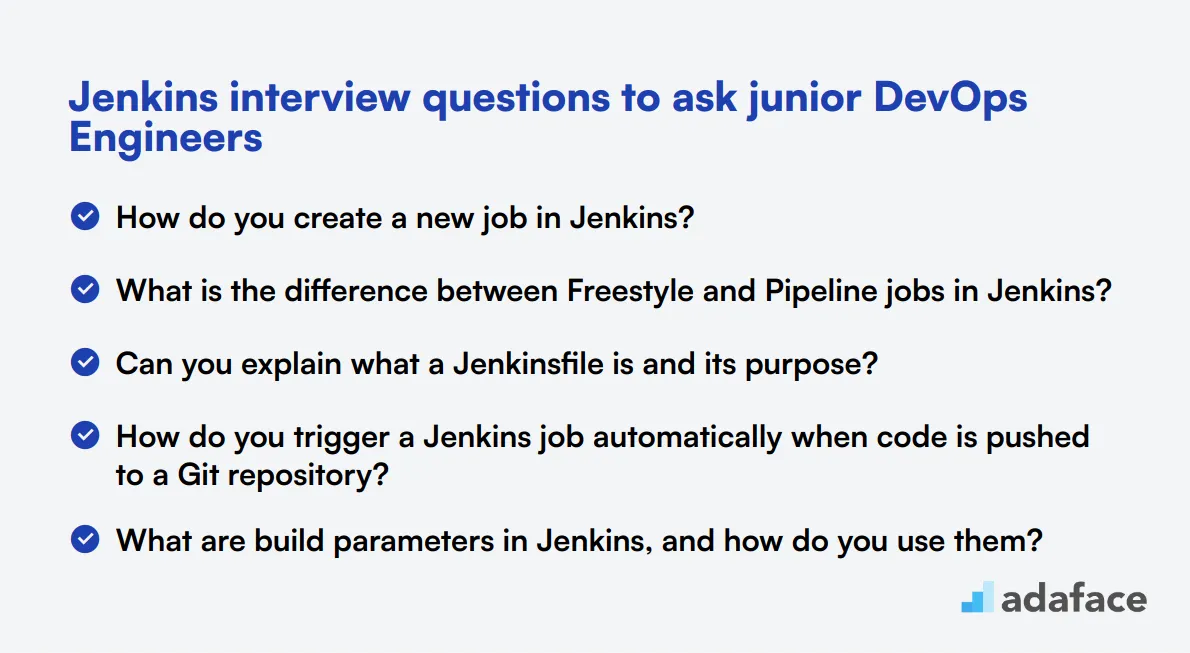
To assess the Jenkins proficiency of junior DevOps Engineers, use these 20 interview questions. They cover essential concepts and practical skills, helping you identify candidates with a solid foundation in Jenkins. Ask these questions to evaluate their understanding of basic Jenkins operations and troubleshooting abilities.
- How do you create a new job in Jenkins?
- What is the difference between Freestyle and Pipeline jobs in Jenkins?
- Can you explain what a Jenkinsfile is and its purpose?
- How do you trigger a Jenkins job automatically when code is pushed to a Git repository?
- What are build parameters in Jenkins, and how do you use them?
- How do you schedule a Jenkins job to run periodically?
- What is the purpose of the Jenkins workspace?
- How do you view and analyze build logs in Jenkins?
- Can you explain what a Jenkins artifact is and how to archive them?
- How do you handle build failures in Jenkins?
- What is the difference between declarative and scripted pipelines in Jenkins?
- How do you install a plugin in Jenkins?
- What is the purpose of the Jenkins 'Execute shell' build step?
- How do you create and manage credentials in Jenkins?
- Can you explain what Jenkins environment variables are and how to use them?
- How do you integrate Jenkins with version control systems like Git?
- What is a Multibranch Pipeline in Jenkins, and when would you use it?
- How do you configure email notifications for build results in Jenkins?
- Can you explain what Jenkins shared libraries are and their benefits?
- How do you backup and restore Jenkins configurations?
10 intermediate Jenkins interview questions and answers to ask mid-tier DevOps Engineers.
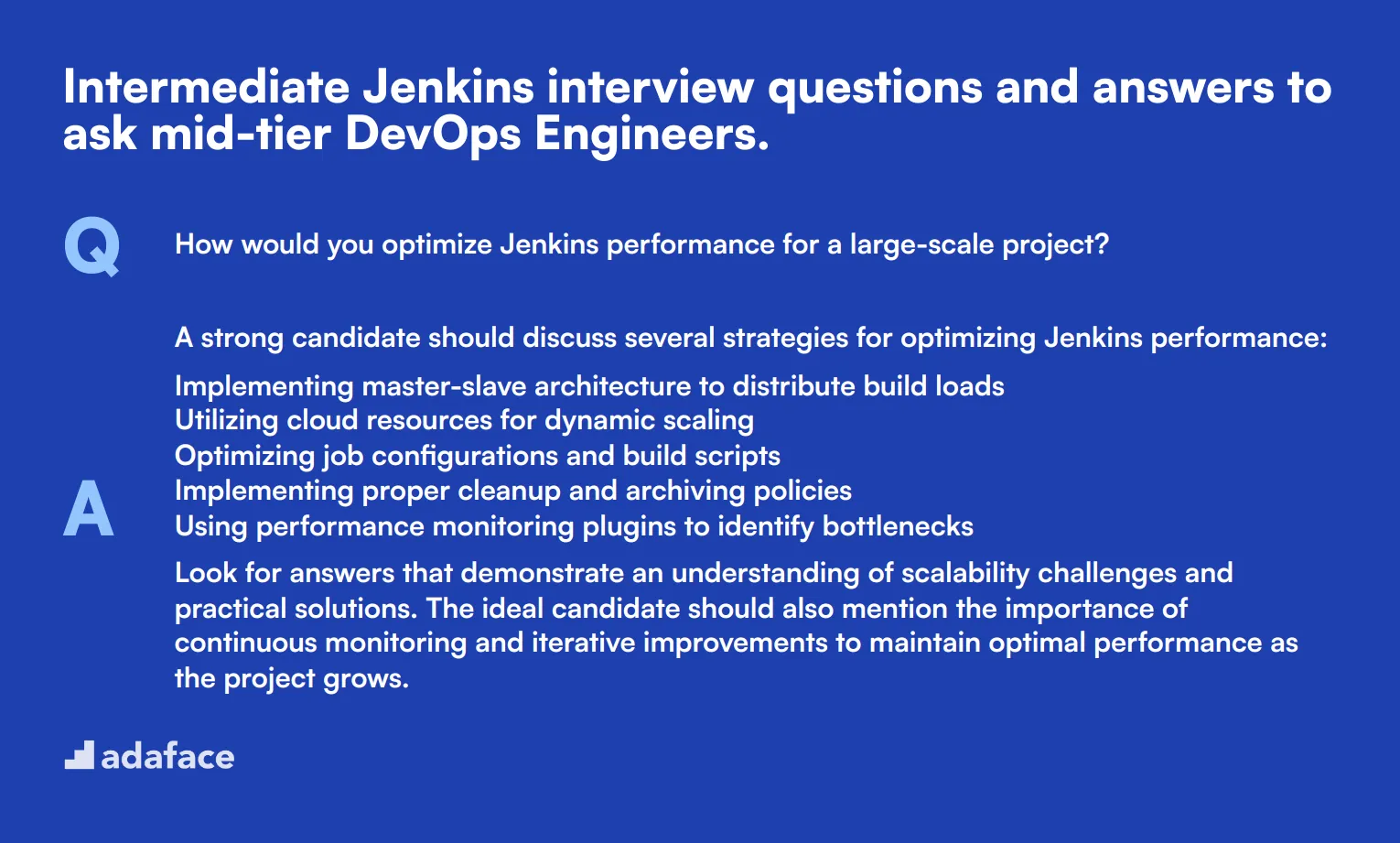
Ready to level up your Jenkins interview game? These 10 intermediate questions are perfect for assessing mid-tier DevOps Engineers. They'll help you gauge a candidate's practical knowledge and problem-solving skills without diving too deep into the technical weeds. Use these questions to spark meaningful discussions and uncover how well a candidate can apply Jenkins in real-world scenarios.
1. How would you optimize Jenkins performance for a large-scale project?
A strong candidate should discuss several strategies for optimizing Jenkins performance:
- Implementing master-slave architecture to distribute build loads
- Utilizing cloud resources for dynamic scaling
- Optimizing job configurations and build scripts
- Implementing proper cleanup and archiving policies
- Using performance monitoring plugins to identify bottlenecks
Look for answers that demonstrate an understanding of scalability challenges and practical solutions. The ideal candidate should also mention the importance of continuous monitoring and iterative improvements to maintain optimal performance as the project grows.
2. Explain how you would set up a Jenkins pipeline for a microservices architecture.
A comprehensive answer should cover the following key points:
- Creating a Jenkinsfile for each microservice
- Implementing parallel execution for independent services
- Using shared libraries for common pipeline steps
- Integrating with container orchestration tools like Kubernetes
- Implementing automated testing and deployment stages for each service
Pay attention to candidates who emphasize the importance of modularity, reusability, and scalability in their pipeline design. A strong answer might also mention strategies for managing dependencies between services and handling rollbacks in case of failures.
3. How would you handle secrets and sensitive information in Jenkins pipelines?
A knowledgeable candidate should discuss multiple approaches to handling sensitive information:
- Using Jenkins Credentials Plugin to store and manage secrets
- Implementing environment variables for sensitive data
- Utilizing external secret management tools like HashiCorp Vault
- Implementing proper access controls and audit trails
- Avoiding hardcoding secrets in pipeline scripts or configuration files
Look for answers that prioritize security best practices and demonstrate awareness of potential vulnerabilities. The ideal candidate should also mention the importance of regularly rotating secrets and monitoring for any unauthorized access attempts.
4. Describe a situation where you had to troubleshoot a failing Jenkins build. What steps did you take?
A strong answer should outline a systematic approach to troubleshooting:
- Reviewing build logs for error messages
- Checking for recent changes in code or build configuration
- Reproducing the issue in a local environment
- Isolating the problem by running specific stages or steps
- Consulting with team members or relevant documentation
- Implementing and testing a fix
- Documenting the issue and solution for future reference
Pay attention to candidates who demonstrate analytical thinking and problem-solving skills. The ideal response should also emphasize the importance of root cause analysis and implementing preventive measures to avoid similar issues in the future.
5. How would you implement a blue-green deployment strategy using Jenkins?
A comprehensive answer should cover the following steps:
- Setting up two identical production environments (blue and green)
- Using Jenkins to build and test the new version
- Deploying the new version to the inactive environment
- Running smoke tests on the new deployment
- Switching traffic from the old to the new environment
- Monitoring for any issues and being prepared to roll back if necessary
Look for candidates who understand the benefits of blue-green deployments, such as reduced downtime and easy rollbacks. They should also mention potential challenges, like managing database migrations or stateful applications, and strategies to address them.
6. How would you integrate automated security scanning into a Jenkins pipeline?
A strong answer should include the following elements:
- Incorporating static code analysis tools (e.g., SonarQube, FindBugs)
- Implementing dependency vulnerability scanning (e.g., OWASP Dependency-Check)
- Integrating dynamic application security testing (DAST) tools
- Setting up container image scanning for vulnerabilities
- Configuring the pipeline to fail builds that don't meet security thresholds
Look for candidates who emphasize the importance of 'shifting left' in security practices. They should also mention the need for balancing security with development speed and discuss strategies for managing false positives and prioritizing vulnerabilities.
7. How would you manage and version control Jenkins job configurations?
A comprehensive answer should cover the following approaches:
- Using 'Configuration as Code' (JCasC) plugin to define Jenkins configurations in YAML
- Storing job configurations in version control systems like Git
- Implementing JobDSL or Jenkins Pipeline for defining jobs programmatically
- Using backup plugins to regularly export configurations
- Implementing a review process for configuration changes
Look for candidates who understand the benefits of treating infrastructure as code. They should emphasize the importance of versioning, reproducibility, and change tracking in managing Jenkins configurations. A strong answer might also mention strategies for testing configuration changes before applying them to production Jenkins instances.
8. How would you implement a canary release strategy using Jenkins?
A strong answer should outline the following steps:
- Building and testing the new version in Jenkins
- Deploying the new version to a small subset of servers or users
- Implementing feature flags to control the rollout
- Using Jenkins to monitor key metrics and performance
- Gradually increasing the canary group if no issues are detected
- Rolling back quickly if problems arise
- Completing the rollout once the canary is deemed stable
Look for candidates who understand the benefits of canary releases in reducing risk and gathering real-world feedback. They should also discuss strategies for defining success criteria, automating the rollout process, and integrating with monitoring and alerting systems.
9. How would you implement Jenkins in a multi-cloud or hybrid cloud environment?
A comprehensive answer should address the following points:
- Setting up Jenkins agents across different cloud providers
- Implementing cloud-agnostic pipeline scripts
- Using infrastructure-as-code tools for consistent environment setup
- Implementing proper security measures for cross-cloud communication
- Utilizing cloud-specific features while maintaining portability
Look for candidates who understand the challenges and benefits of multi-cloud environments. They should emphasize the importance of abstraction layers, standardization, and proper cloud engineering practices. A strong answer might also discuss strategies for optimizing cost and performance across different cloud providers.
10. How would you implement continuous deployment with Jenkins while ensuring high availability?
A strong answer should cover the following aspects:
- Implementing a robust testing strategy, including unit, integration, and end-to-end tests
- Utilizing blue-green or canary deployment strategies
- Implementing automated rollback mechanisms
- Setting up proper monitoring and alerting systems
- Using feature flags to control feature releases
- Implementing traffic management and load balancing
Look for candidates who understand the balance between speed and reliability in continuous deployment. They should emphasize the importance of gradual rollouts, real-time monitoring, and quick response to issues. A good answer might also discuss strategies for handling database migrations and managing stateful applications in a continuous deployment scenario.
12 Jenkins questions related to pipelines and jobs
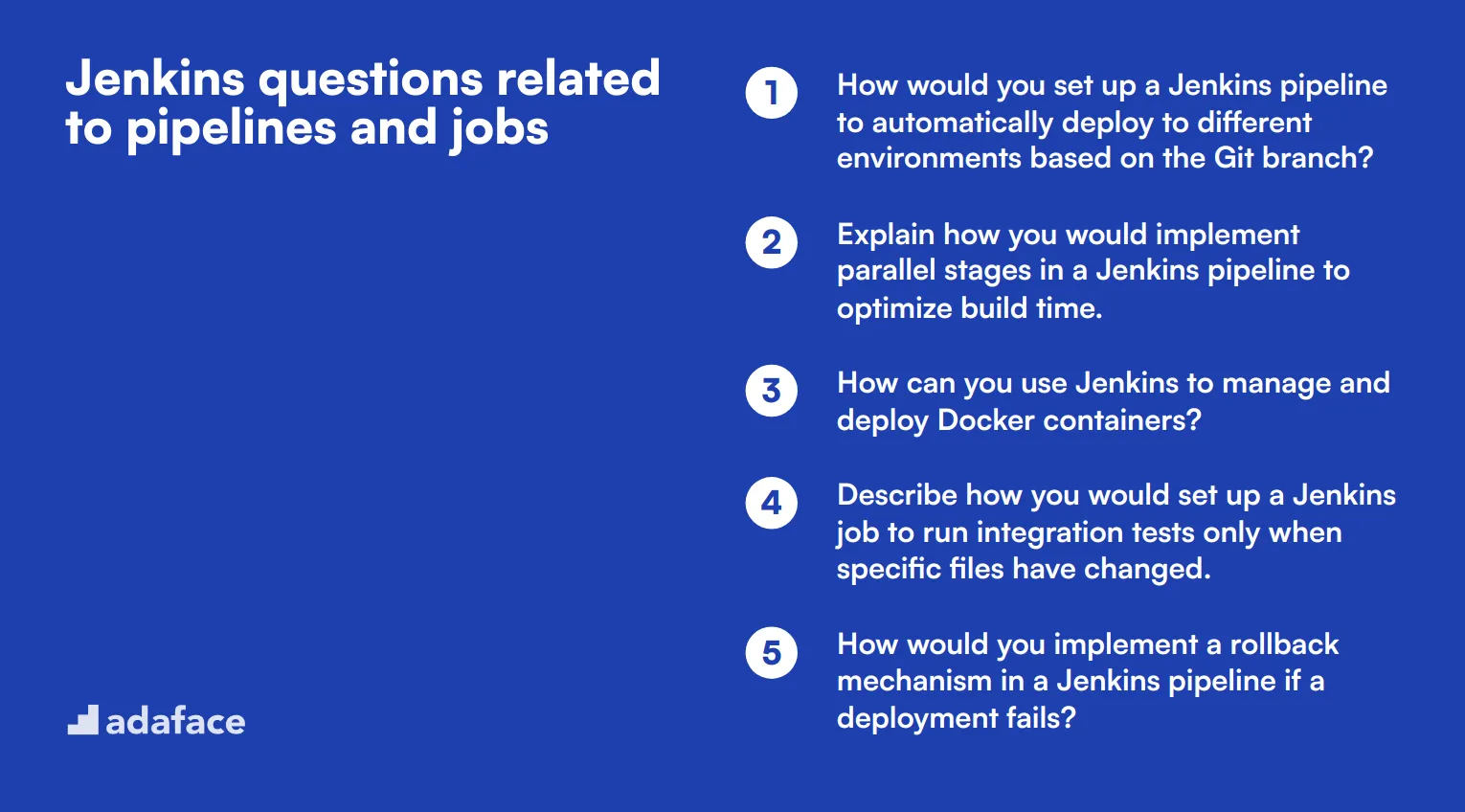
To assess candidates' proficiency with Jenkins pipelines and jobs, use these questions to probe their practical experience. These queries will help you evaluate a software engineer's ability to implement and manage complex CI/CD workflows, crucial for modern development practices.
- How would you set up a Jenkins pipeline to automatically deploy to different environments based on the Git branch?
- Explain how you would implement parallel stages in a Jenkins pipeline to optimize build time.
- How can you use Jenkins to manage and deploy Docker containers?
- Describe how you would set up a Jenkins job to run integration tests only when specific files have changed.
- How would you implement a rollback mechanism in a Jenkins pipeline if a deployment fails?
- Explain how you would use Jenkins to orchestrate a microservices deployment.
- How can you use Jenkins to manage database migrations as part of your deployment process?
- Describe how you would implement a Jenkins pipeline for a monorepo containing multiple projects.
- How would you set up Jenkins to run performance tests and fail the build if certain thresholds are not met?
- Explain how you would use Jenkins to manage and deploy infrastructure as code using tools like Terraform.
- How can you use Jenkins to implement a feature flag deployment strategy?
- Describe how you would set up a Jenkins pipeline to handle both frontend and backend deployments in a single workflow.
7 Jenkins interview questions and answers related to plugins
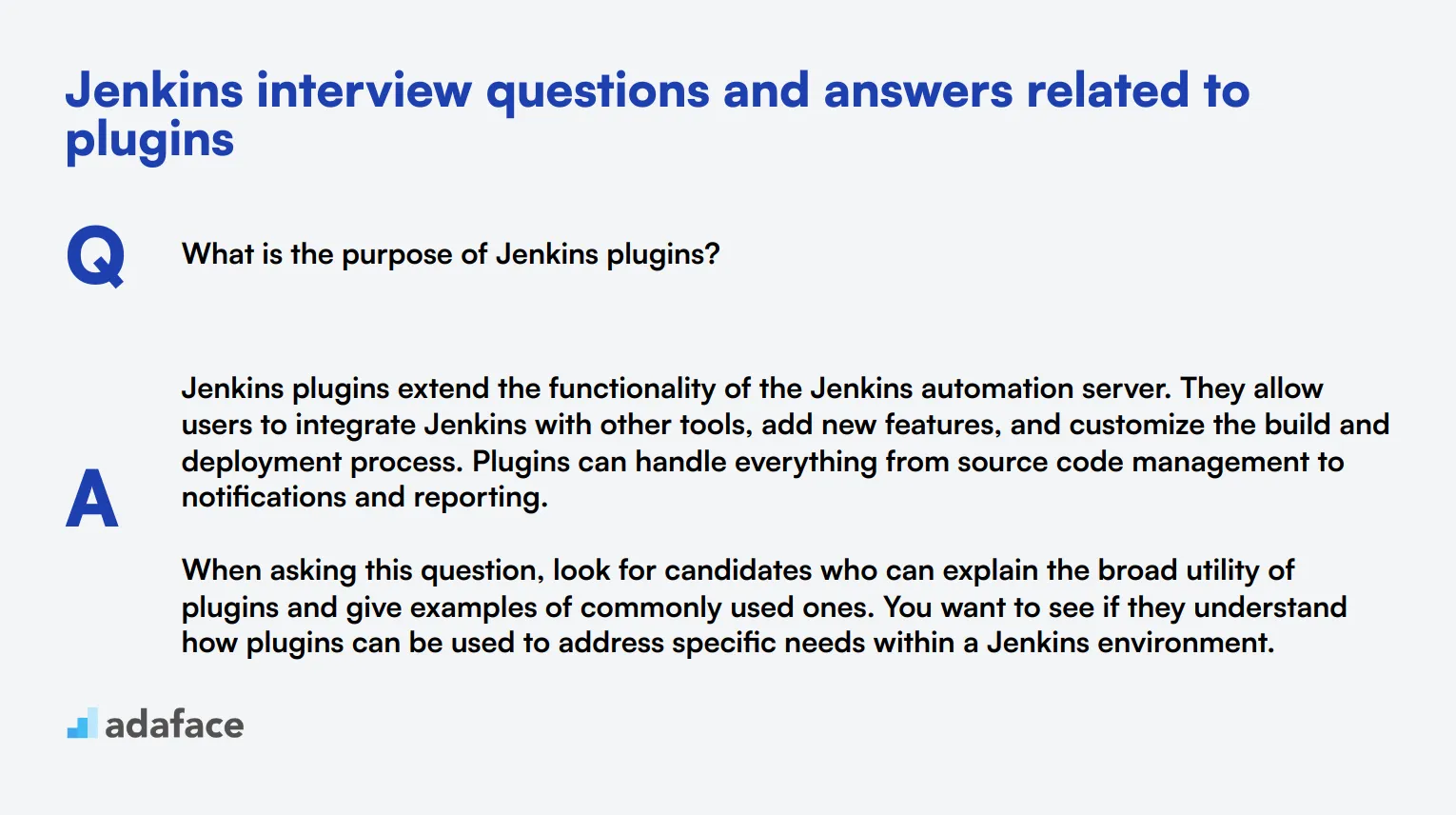
To ensure your candidates have a solid grasp of Jenkins plugins, use these interview questions. They will help you gauge their ability to manage and utilize plugins effectively within their continuous integration pipelines. Perfect for determining both practical knowledge and problem-solving skills.
1. What is the purpose of Jenkins plugins?
Jenkins plugins extend the functionality of the Jenkins automation server. They allow users to integrate Jenkins with other tools, add new features, and customize the build and deployment process. Plugins can handle everything from source code management to notifications and reporting.
When asking this question, look for candidates who can explain the broad utility of plugins and give examples of commonly used ones. You want to see if they understand how plugins can be used to address specific needs within a Jenkins environment.
2. How do you evaluate which plugins to use in Jenkins?
Evaluating Jenkins plugins involves several steps. First, identify the specific needs of your project or team. Next, research available plugins and consider their popularity, reviews, and maintenance frequency. It’s also important to test plugins in a staging environment before deploying them to production.
Strong candidates should demonstrate a methodical approach to plugin selection, emphasizing due diligence in research and testing. They should also mention the importance of community support and regular updates for maintaining plugin reliability.
3. Can you describe a situation where a Jenkins plugin helped you solve a problem?
A good response might detail a specific challenge, such as integrating Jenkins with a version control system or automating deployment tasks. The candidate should explain which plugin they used, how it was implemented, and the positive impact it had on their workflow.
Look for answers that highlight problem-solving skills and the ability to leverage available tools effectively. An ideal candidate will give a clear example, showing not only what they did but also why it was beneficial.
4. What are some best practices for managing Jenkins plugins?
Best practices for managing Jenkins plugins include regularly updating plugins to the latest versions, removing unused plugins to reduce maintenance overhead, and thoroughly testing new plugins in a staging environment before deploying them to production. It's also wise to keep an eye on plugin dependencies and compatibility with the Jenkins core.
This question is aimed at gauging the candidate’s approach to maintaining a clean and efficient Jenkins environment. Ideal responses should emphasize proactive management and the importance of testing and compatibility.
5. How do Jenkins plugins contribute to continuous delivery and deployment?
Jenkins plugins play a crucial role in continuous delivery and deployment by automating various stages of the pipeline. Plugins can trigger builds, run tests, deploy artifacts, and notify team members of build statuses. They help streamline the process and ensure a consistent and reliable deployment pipeline.
Candidates should be able to articulate how plugins integrate into the broader continuous delivery ecosystem. Look for examples of specific plugins they have used and how these contributed to automating and optimizing their workflows.
6. How do you handle plugin failures or compatibility issues in Jenkins?
When facing plugin failures or compatibility issues, the first step is to check the Jenkins logs for error messages. Next, consult the plugin documentation and community forums for potential solutions. If necessary, roll back to a previous plugin version or seek alternative plugins. Regular backups of Jenkins configurations can also help mitigate risks.
An ideal candidate response will demonstrate troubleshooting skills and emphasize the importance of backup plans and community resources. They should also mention the value of thorough testing before deploying plugin updates.
7. How would you go about creating a custom Jenkins plugin?
Creating a custom Jenkins plugin involves setting up a development environment, writing the plugin code, and packaging it for deployment. The process includes defining the plugin’s architecture, writing the required functionalities, and testing it thoroughly. Once developed, the plugin can be uploaded to the Jenkins update center or installed manually.
While this question is more advanced, you’re looking for an understanding of the development lifecycle and the ability to extend Jenkins functionality when necessary. Candidates should highlight their ability to write and debug code, even if detailed technical specifics are not required in their answer.
Which Jenkins skills should you evaluate during the interview phase?
While it's challenging to fully gauge a candidate's capabilities in one interview, focusing on core Jenkins skills can provide significant insights. This section outlines the key Jenkins skills that interviewers should assess to identify the most competent candidates.
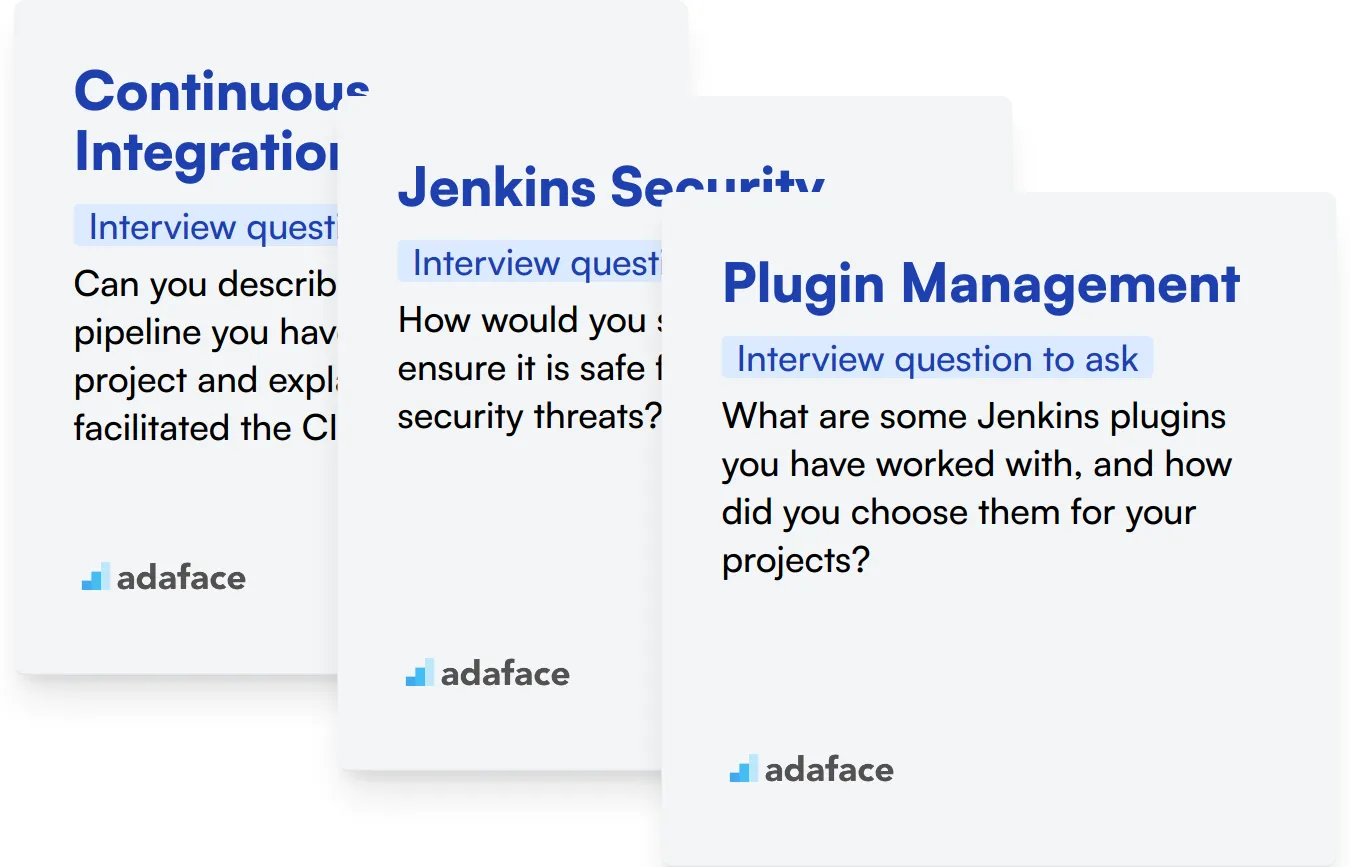
Continuous Integration/Continuous Deployment (CI/CD)
CI/CD practices are central to modern DevOps operations, making them a critical area of knowledge for Jenkins professionals. Jenkins automates parts of this process, facilitating faster and safer product iterations.
For a thorough assessment, consider utilizing a set of targeted MCQs. Adaface offers a Jenkins online assessment to help screen candidates efficiently on their understanding and practical skills in CI/CD using Jenkins.
To further evaluate a candidate's knowledge, ask direct questions that probe their experience and understanding of CI/CD principles.
Can you describe a Jenkins pipeline you have set up for a past project and explain how it facilitated the CI/CD process?
Look for detailed explanations that include specifics on Jenkinsfile configuration, pipeline stages, and management of artifacts. The candidate's ability to describe troubleshooting methods is also essential.
Jenkins Security
Security is a critical component of Jenkins administration, ensuring safe and authorized access to build processes and outputs. Candidates should demonstrate a strong grasp of Jenkins security mechanisms.
To efficiently screen candidates on Jenkins security, consider incorporating relevant multiple-choice questions from the Adaface library, specifically tailored to evaluate security practices.
Pose scenario-based questions that assess their ability to secure a Jenkins environment.
How would you secure Jenkins to ensure it is safe from common security threats?
Look for answers that mention role-based access control, use of credentials, configuring secure access protocols, and regular updates to Jenkins and plugins.
Plugin Management
Jenkins’ extensibility through plugins allows it to meet diverse build and deployment needs. Understanding plugins is necessary for customizing Jenkins effectively.
Assess candidate's expertise in plugin management by asking about their direct experiences.
What are some Jenkins plugins you have worked with, and how did you choose them for your projects?
Candidates should demonstrate knowledge of popular plugins and provide rationales for their choices based on project requirements and plugin functionality.
3 Tips for Using Jenkins Interview Questions
Before you start putting what you've learned to use, here are some tips to help you effectively use Jenkins interview questions.
1. Incorporate Skills Tests Before the Interview
Using skills tests before interviews can help you ensure that candidates have the necessary expertise for the role. This saves time and allows for more productive interviews.
Consider using the Adaface DevOps Online Test to evaluate general DevOps skills and the Ansible and Jenkins Online Test to specifically assess Jenkins knowledge.
The benefits of this approach are clear: you can filter candidates based on actual skills, making your interviews more focused and reducing the likelihood of hiring someone who is not a good fit.
2. Compile Relevant and Concise Interview Questions
Selecting the right number of questions is crucial. You don't have a lot of time, so choose questions that cover important fronts and subskills.
In addition to Jenkins questions, consider including some related to communication or team culture. These aspects are also vital for a role in DevOps.
Refer to our library of interview questions to guide you in compiling a balanced set of questions that will maximize your ability to evaluate candidates.
3. Ask Follow-Up Questions
Just using the prepared interview questions is not enough. Follow-up questions help you understand the depth of a candidate's knowledge and whether they are a good fit for the role.
For example, if you ask a candidate about their experience with Jenkins pipelines, follow up by asking for specific instances when they had to troubleshoot a pipeline issue. This will help you gauge their real-world problem-solving abilities.
Use Jenkins interview questions and skills tests to hire talented DevOps Engineers
If you're looking to hire someone with Jenkins skills, you need to ensure they possess the necessary expertise. The best way to do this would be to use skill tests. Check out our Jenkins assessment test or our DevOps online test.
Once you've used these tests, you can shortlist the best candidates and call them for interviews. For the next step, sign up on our platform at Adaface Signup or explore our online assessment platform to get started.
DevOps Test
Download Jenkins interview questions template in multiple formats
Jenkins Interview Questions FAQs
Ask about their understanding of Jenkins basics, how they configure jobs, and their experience with Jenkins plugins.
Focus on continuous integration challenges, Jenkins pipeline creation, and troubleshooting common issues.
Inquire about specific pipeline use cases, their steps in creating a Jenkins pipeline, and any issues faced during implementation.
Ask candidates about their favorite plugins, how they manage plugin dependencies, and examples of plugin-related issues they have resolved.
These questions can help determine the candidate's practical knowledge, problem-solving skills, and ability to work with Jenkins in real-world scenarios.
Diverse questions give a well-rounded view of the candidate’s skills, experience, and approach to using Jenkins in different aspects of DevOps.

40 min skill tests.
No trick questions.
Accurate shortlisting.
We make it easy for you to find the best candidates in your pipeline with a 40 min skills test.
Try for freeRelated posts
Free resources




